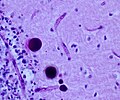Glycogen storage diseases
Glycogen storage diseases a group of diseases characterized by the accumulation of glycogen.
Clinical picture
- Exercise intolerance
- Usually due to specific muscle enzyme defects
DDx:
- Mitochondriopathies
- Carnitine palmitoyltransferase II (CPT2) deficiency
General microscopic
Features:[1]
- +/-Vacuolated muscle fibres.
- acid phosphatase+ve in vaculoes.
- PAS+ve.
Images:
Electron microscopy
- Electron dense deposits.
Specific diseases
Pompe disease
General
Deficiency of alpha-1,4-glucosidase; it degrades glycogen to glucose in lysosomes.
Clinical:
- Floppy baby.
- Big heart.
- Often early death from cardiac failure.
Cori disease
General
- Hepatomegaly.
Microscopic
Features:
- Hypertrophic hepatocytes with pale cytoplasm.
- Classically: PAS +ve, PAS-D -ve.
- Portal fibrosis.
Image:
Stains
See also
References
- ↑ URL: http://neuromuscular.wustl.edu/pathol/acidmchi.htm. Accessed on: 11 January 2011.
- ↑ URL: http://www.ncbi.nlm.nih.gov/omim/606800. Accessed on: 11 January 2011.
- ↑ URL: http://www.ncbi.nlm.nih.gov/omim/232400. Accessed on: 25 January 2011.






